Impacts of Climate Change on Marine Ecosystems and the Fate, Transport and Toxicity of Contaminants
A special issue of Water (ISSN 2073-4441). This special issue belongs to the section "Water and Climate Change".
Deadline for manuscript submissions: 20 February 2026 | Viewed by 385

Special Issue Editors
Interests: ecotoxicology; marine ecosystems; climate change; ocean acidification; contaminants
Interests: marine ecology; climate change; anthropogenic pressures; ecophysiology; marine restoration
Special Issues, Collections and Topics in MDPI journals
Special Issue Information
Dear Colleagues,
The rapid pace at which climate change is increasingly affecting marine ecosystems compels the scientific community to investigate how environmental shifts influence both marine biodiversity and the toxicity of environmental contaminants. These effects must be evaluated not only for traditional pollutants (e.g., metals, metalloids, and organic compounds) but also for emerging contaminants, the toxicological profiles of which remain poorly understood over long timescales. In recent years, researchers have employed a variety of approaches to tackle this challenge—from in vitro exposure studies and mesocosm experiments to investigations of natural populations.
This Special Issue highlights the latest advancements in this field and invites the submission of original research articles, reviews, and short communications that contribute to a deeper understanding of these complex interactions.
Potential topics include, but are not limited to, the following:
- Impacts of climate change (CC) and ocean acidification (OA) on marine biodiversity;
- Effects of interactions between CC/OA and conventional contaminants on key species;
- Interactions between CC/OA and emerging contaminants;
- Changes in bioaccumulation and bioconcentration patterns;
- Short- and long-term effects on marine populations;
- Implications for environmental monitoring and policy development.
Dr. Andrea Gaion
Dr. Marco Munari
Guest Editors
Manuscript Submission Information
Manuscripts should be submitted online at www.mdpi.com by registering and logging in to this website. Once you are registered, click here to go to the submission form. Manuscripts can be submitted until the deadline. All submissions that pass pre-check are peer-reviewed. Accepted papers will be published continuously in the journal (as soon as accepted) and will be listed together on the special issue website. Research articles, review articles as well as short communications are invited. For planned papers, a title and short abstract (about 250 words) can be sent to the Editorial Office for assessment.
Submitted manuscripts should not have been published previously, nor be under consideration for publication elsewhere (except conference proceedings papers). All manuscripts are thoroughly refereed through a single-blind peer-review process. A guide for authors and other relevant information for submission of manuscripts is available on the Instructions for Authors page. Water is an international peer-reviewed open access semimonthly journal published by MDPI.
Please visit the Instructions for Authors page before submitting a manuscript. The Article Processing Charge (APC) for publication in this open access journal is 2600 CHF (Swiss Francs). Submitted papers should be well formatted and use good English. Authors may use MDPI's English editing service prior to publication or during author revisions.
Keywords
- ecotoxicology
- marine ecosystems
- climate change
- ocean acidification
- contaminants
- toxicity
- biological responses
- bioaccumulation
- bioconcentration
- adaptative strategies
Benefits of Publishing in a Special Issue
- Ease of navigation: Grouping papers by topic helps scholars navigate broad scope journals more efficiently.
- Greater discoverability: Special Issues support the reach and impact of scientific research. Articles in Special Issues are more discoverable and cited more frequently.
- Expansion of research network: Special Issues facilitate connections among authors, fostering scientific collaborations.
- External promotion: Articles in Special Issues are often promoted through the journal's social media, increasing their visibility.
- Reprint: MDPI Books provides the opportunity to republish successful Special Issues in book format, both online and in print.
Further information on MDPI's Special Issue policies can be found here.






